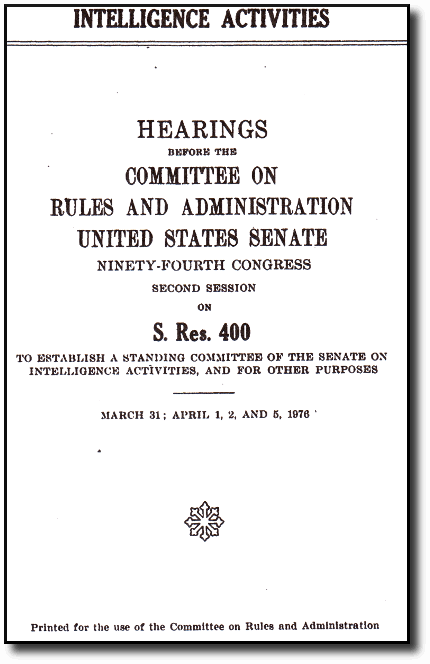
In December 1974 The New York Times published a shocking article by Seymour Hersh detailing "a massive, illegal domestic intelligence operation during the Nixon Administration." Hersh reported on a host of "illegal activities by members of the CIA, inside the United States, beginning in the nineteen-fifties, including break-ins, wiretapping and the surreptitious inspection of mail."[1] In response to Hersh's article, as well as to growing allegations of abuse committed abroad by U.S. intelligence agencies, the Senate voted to establish the Select Committee to Study Governmental Operations with Respect to Intelligence Activities. The mandate of the Committee was to investigate the activities of federal intelligence agencies, including the CIA, the FBI, the Defense Intelligence Agency, and the National Security Agency, going back to the 1930s. Senator Mondale played a key role in the Committee's investigations.
The Committee initially interviewed witnesses in private executive sessions and then conducted twenty-one days of public hearings between September and December 1975. By early 1976, the Committee had interviewed eight hundred witnesses and reviewed over 110,000 pages of classified documents.[2] Senator Mondale was a relentless interrogator and had little patience with witnesses who had not questioned the legality of their actions. After questioning two former postmasters general, Mondale stated: "I must say that the testimony I have just heard from you ... scares me more than I expected. Not only have we found gross and unconscionable interference with the mail which threatens the civil liberties of every American, but we have the testimony from two former postmasters general that they do not think it is wrong, even today."[3] A contentious exchange with Attorney General Edward Levi during the hearings on the FBI encapsulates Senator Mondale's firm belief in congressional oversight and in the rule of law. Mr. Levi resisted the Committee's request to submit a list of illegal activities conducted by the FBI which had been compiled by Elliot Richardson, attorney general under President Nixon. Senator Mondale ended his interrogation by saying, "Well, I think that kind of arrogance is why we have trouble between the executive and legislative branch."[4]
Throughout the hearings, Senator Mondale repeatedly argued the need for "scrupulous adherence to the law and the Constitution by the agencies of Government."[5] He criticized the CIA's use of "plausible deniability"—the denial of blame in loose and informal chains of command where confirming responsibility for the action is nearly impossible—and stressed the need for accountability in all areas of intelligence: "I worry ... because there was this ... strategy ... of plausible denial, that ... might have encouraged actions that would not have occurred had those who were the real actors expected accountability. In other words, I think it is very easy to diminish in one's thinking moral and other considerations when you are quite sure you're not going to get caught.... I think human nature might, under those kinds of expectations, lead people to do things that they would never do if they were to be held accountable."[6]
Lawrence Jacobs, Walter F. and Joan Mondale Chair for Political Studies at the University of Minnesota, summarized Mr. Mondale's role in investigating U.S. intelligence activities in his essay "Walter Mondale: In the Tradition of James Madison."
"Senator Mondale played a decisive role in balancing individual liberties and homeland security. In the aftermath of the Watergate crisis, an unparalleled bipartisan investigation of American domestic and international security services was conducted by a committee chaired by Senator Frank Church. Although widely known as the 'Church Committee,' Senator Mondale assumed operational leadership of the investigation—according to the Committee chief counsel Frederick A. O. Schwartz, Jr.—following Senator Church's decision to run for president.
The Committee's findings were staggering, making plain the need for vigilant scrutiny of government. In addition to revelations of sordid and ill-conceived efforts to assassinate foreign leaders, the Mondale-Church investigations documented F.B.I. plans to undermine Martin Luther King, Jr. and engage in wide-ranging inappropriate and illegal activities violating the Bill of Rights. Legislative intervention to check executive branch excess was precisely the kind of counterbalancing that James Madison identified as essential to preventing tyranny and injustice. Walter Mondale also sought a workable balance between America's security against foreign attack and the results of unchecked power uncovered by the Mondale-Church investigations. As Senator, and then as Vice President, Mr. Mondale worked both with America's national security services to facilitate intelligence-gathering and with constitutional experts to create a judicial process of review.
The resulting law, the Foreign Intelligence Surveillance Act (FISA) of 1978, became a cornerstone of American governance, recasting the issue of security versus civil liberties into a synthesis that advanced both. The FISA process continues to be an important rallying point for the bipartisan resistance to recent governmental policies on domestic surveillance."[7]
- Seymour M. Hersh, "Huge C.I.A. Operation Reported in U.S. Against Antiwar Forces, Other Dissidents in Nixon Years," The New York Times (Dec. 22, 1974) at 1.
- Walter Mondale, The Good Fight (New York: Scribner) at 151.
- Select Committee to Study Governmental Operations with Respect to Intelligence Activities. Senate Resolution 21: Mail Opening. 94th Cong., 1st sess., October 22, 1975 at 53-54.
- Select Committee to Study Governmental Operations with Respect to Intelligence Activities. Senate Resolution 21: Federal Bureau of Investigation. 94th Cong., 1st sess., December 11, 1975 at 332.
- Select Committee to Study Governmental Operations with Respect to Intelligence Activities. Senate Resolution 21: Federal Bureau of Investigation. 94th Cong., 1st sess., November 19, 1975 at 63.
- Select Committee to Study Governmental Operations with Respect to Intelligence Activities. Testimony of Thomas A. Parrott, former Central Intelligence Agency Official. 94th Cong., 1st sess., July 10, 1975 at 10-11.
- Lawrence Jacobs, "Walter Mondale: In the Tradition of James Madison," unpublished essay written to accompany an exhibition in celebration of Walter Mondale held in the Riesenfeld Rare Books Research Center, University of Minnesota Law Library, 2008.